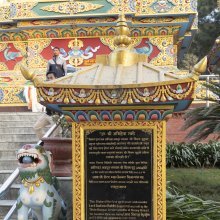Phita, Phīta: 5 definitions
Introduction:
Phita means something in Buddhism, Pali, Marathi, Hindi. If you want to know the exact meaning, history, etymology or English translation of this term then check out the descriptions on this page. Add your comment or reference to a book if you want to contribute to this summary article.
Images (photo gallery)
Languages of India and abroad
Pali-English dictionary
Source: BuddhaSasana: Concise Pali-English Dictionaryphīta : (adj.) opulent; prosperous; rich.
Source: Sutta: The Pali Text Society's Pali-English DictionaryPhīta, (pp. of sphāy, cp. Sk. sphīta & see phāti) opulent, prosperous, rich; in the older texts only in stock phrase iddha ph. bahujana (rich & prosperous & well-populated) D. I, 211 (of the town Nālandā); II, 146 (of Kusāvatī); M. I, 377; (of Nālandā) II. 71 (of country); S. II, 107 (fig. of brahmacariyaṃ; with bahujañña for °jana); A. III, 215 (of town). By itself & in other combn in the Jātakas, e.g. J. IV, 135 (=samiddha); VI, 355 (v. l. pīta). With iddha & detailed description of all classes of the population (instead of bahujana) of a town Miln. 330. (Page 479)
— or —
Phīta, (pp. of sphāy, cp. Sk. sphīta & see phāti) opulent, prosperous, rich; in the older texts only in stock phrase iddha ph. bahujana (rich & prosperous & well-populated) D. I, 211 (of the town Nālandā); II, 146 (of Kusāvatī); M. I, 377; (of Nālandā) II. 71 (of country); S. II, 107 (fig. of brahmacariyaṃ; with bahujañña for °jana); A. III, 215 (of town). By itself & in other combn in the Jātakas, e.g. J. IV, 135 (=samiddha); VI, 355 (v. l. pīta). With iddha & detailed description of all classes of the population (instead of bahujana) of a town Miln. 330. (Page 479)

Pali is the language of the Tipiṭaka, which is the sacred canon of Theravāda Buddhism and contains much of the Buddha’s speech. Closeley related to Sanskrit, both languages are used interchangeably between religions.
Marathi-English dictionary
Source: DDSA: The Molesworth Marathi and English Dictionaryphīṭa (फीट).—f (phiṭaṇēṃ) Liquidated or discharged state (of debts): requited state (of favors or kindnesses). 2 A spindle or spike around which thread or string is wound. 3 n R A tapering piece of wood used to force or to maintain an opening; a little wedge.
--- OR ---
phīta (फीत).—f (Fita. Port.) Riband, lace, narrow tape. 2 Properly sphīti.
Source: DDSA: The Aryabhusan school dictionary, Marathi-Englishphīṭa (फीट).—f Liquidated or discharged state (of debts): requited state.
--- OR ---
phīta (फीत).—f Riband, lace, narrow tape.
Marathi is an Indo-European language having over 70 million native speakers people in (predominantly) Maharashtra India. Marathi, like many other Indo-Aryan languages, evolved from early forms of Prakrit, which itself is a subset of Sanskrit, one of the most ancient languages of the world.
Hindi dictionary
Source: DDSA: A practical Hindi-English dictionary1) Phiṭa (फिट):—([ṭi]) [na] (nf) a phaeton (two-wheeled carriage driven by a horse).
2) Phītā (फीता):—(nm) a lace, ribbon; tape; strap; shoelace; fillet.
...
See also (Relevant definitions)
Starts with: Phitai, Phitala, Phitalo, Phitamphata, Phitana, Phitanem, Phitara, Phitarata, Phitarati, Phitava, Phitavani, Phitavinem.
Ends with: Abhigumphita, Ariphita, Avagumphita, Gulphita, Gumphita, Guphita, Humphita, Parisphita, Pupphita, Raphita, Riphita, Sampupphita, Samsphita, Shophita, Sphita, Supupphita, Susphita, Uphita, Viriphita, Visphita.
Full-text: Chitapita, Foot, Phullita, Kaduvitala, Malamala, Katadem, Vyuha, Bahujanna, Phati, Iddha, Bhendi, Panga, Lal, Divana, Bhenda, Akinna, Kharakhara, Pitta, Lala.
Relevant text
No search results for Phita, Phīta, Phīṭa, Phiṭa, Phītā; (plurals include: Phitas, Phītas, Phīṭas, Phiṭas, Phītās) in any book or story.
